By KATIE EUBANKS
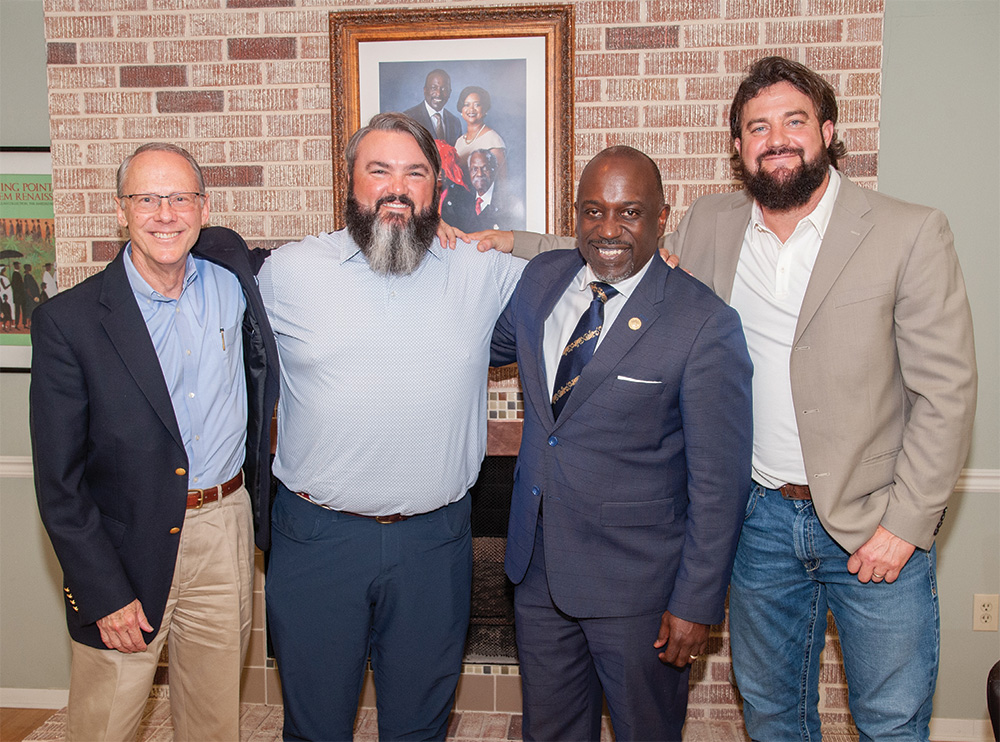
Rick Courtney, Nathan Stamper, Rev. Reginald Buckley, and Brent Leach
MCL Editor Katie Eubanks Ginn recently sat down with four men from across the Jackson metro area who serve in a variety of contexts, from pulpits to baseball fields, legal offices and living rooms. They talked about their spiritual influences, what it takes to disciple men, and what God has taught them in their careers and ministries. The interview has been edited for space and clarity, but you can hear it in full on the MCL podcast, “A Closer Walk.” Just go to Apple Podcasts or Spotify and search “Mississippi Christian Living”!
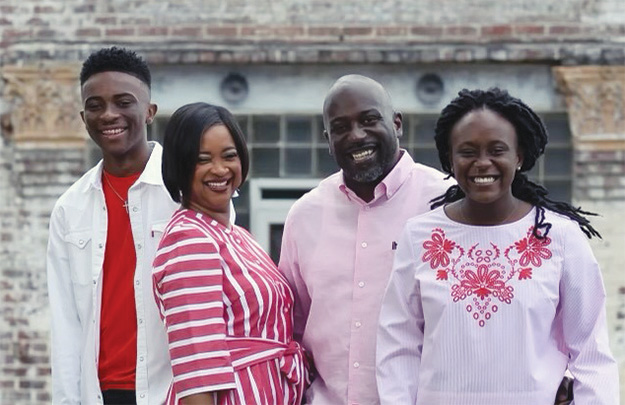
Rev. Reginald Buckley
● Senior Pastor, Cade Chapel Missionary Baptist Church, Jackson
● Married to Dr. Lecretia Buckley
● Children: Jonathan and Anna
● Wise words: “God is big enough, He’s strong enough, and He knows enough to handle the things we don’t know or understand.”
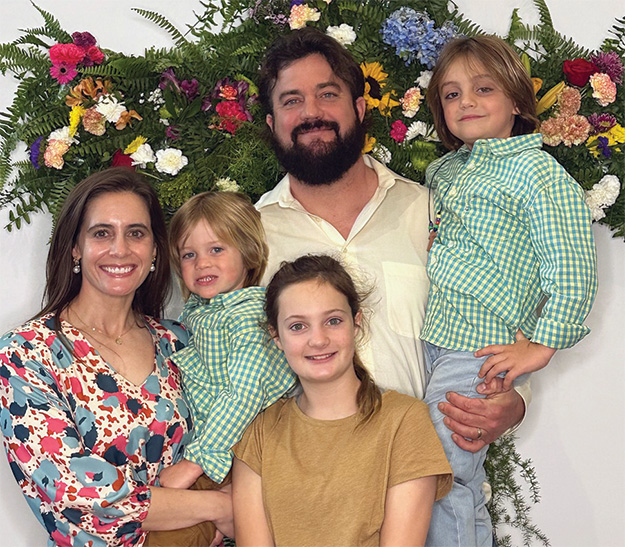
Brent Leach
● Director of Men’s Ministry and Sports Ministry, First Baptist Brandon
● Married to Sara Leach
● Children: Lily (11), Asher (6), Judson (4)
● Wise words: “There are no more Mayberrys. Satan is trying to take it all down. Don’t just take what you hear on Sunday and put it in your pocket for your own benefit. We’ve got to keep our eyes up and be in the fight.”
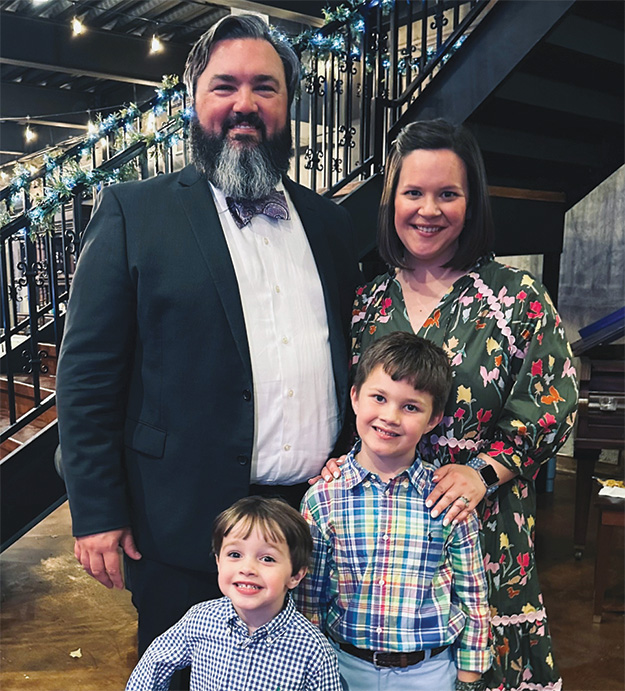
Nathan Stamper
● Spiritual Life Director and Assistant Baseball Coach, Madison-Ridgeland Academy
● Married to Leanne Stamper
● Children: Rush (8), Sam (4)
● Wise words: “It’s up to me to plant the seeds, but the Lord produces the harvest. It’s pretty easy to get caught up in being personally responsible for people’s salvation. (But) the Lord is the one who gets to do those things.”
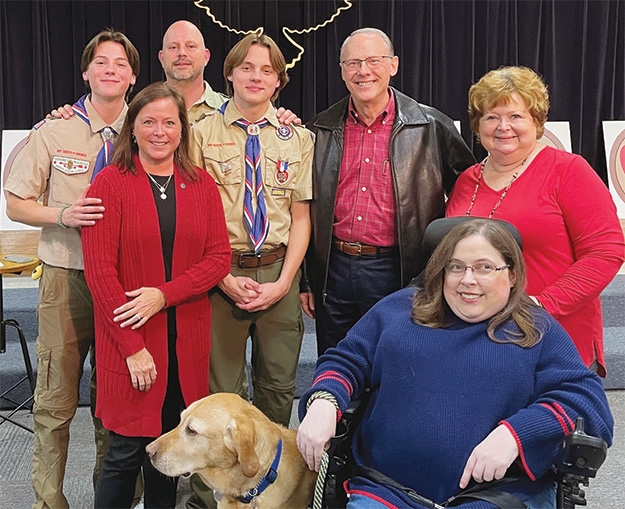
Rick Courtney
● Owner and founding partner, Courtney Elder Law Associates, Madison
● Married to Ruthie
● Children: Twins Melissa and Melanie; Melissa is married to Wes McCleese and they have two sons, Will and Owen.
● Wise words: “Lawyers are trained to control things. (But) I have learned I don’t know what’s going to happen. I need to relax in my faith.”
Katie Eubanks Ginn: Rev. Buckley, since you’re hosting us here at Cade, I’ll let you answer this one first: Who are your greatest spiritual influences?
Rev. Reginald Buckley: It started in the home, (with) my dad pastoring this church for 45 years.
About three weeks ago … someone had posted one of his sermons from 1972 on YouTube … I heard that record all the time as a child, but now listening to it as an adult, I’m listening to social issues he was dealing with in that sermon that I never realized as a child. I’m like, wow, he was talking about the killings at JSU during that time. Just before, he was talking about the proliferation of weapons in the United States.
I got that honest, when I think about my own preaching style and how I try to deal with those issues as well. I listen to my own sermons and I hear echoes of him.
Rick Courtney: (My spiritual influences go) back before my parents. My grandparents were just salt of the earth Christian folks from Copiah County. I would go down and spend some weeks and summers on (their) farm. My granddad would get up and make scrambled eggs and toast and read the Bible.
Brent Leach: I was blessed with a godly father and mother. I was brought up in church, where I had a youth pastor, Kevin Cooper, who … at the time, you didn’t realize you were being discipled, but when you look back … you see where the providence of God had men around you to show you how to be a follower of Christ.
Nathan Stamper: My parents loved the Lord. My dad worked for the MDOT (Mississippi Department of Transportation), and he’d be out the door at 4:30 every morning. But he’d get up early so he could read his Bible, and he’d leave it open to what he read. So when my sister and I woke up, that’s the first thing we saw.
I was also really close with my grandparents. I went to their tiny, country Methodist church. I was able to see those examples early on.
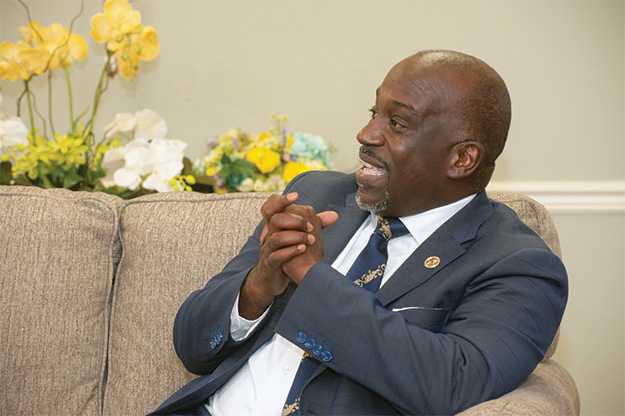
KG: Brent, you said you didn’t realize you were being discipled. Is there something to that? I’d love to hear what y’all think it takes to disciple young men.
BL: There’s an intentionality there. (My spiritual leaders) were all up in my business. My first year playing pro ball (for the Los Angeles Dodgers), I got injured, and I’d just gotten married, and I got sent back to Vero Beach. Every day after rehab, the chaplain would be there. ‘Can I take you to lunch?’
I was being pursued by a guy who saw something in me. I can hear myself (now) saying some of those things he said to me.
RC: My dad was not that active in the activities of the church with me, but he was supportive. But it was men in the church …. Particularly Norris Stampley, who worked for Mississippi Power and Light … he was like my surrogate dad, taking me to outings, to campouts … and I watched how he lived his life. And he and others taught Sunday school classes or church training union classes … and that’s where I (learned) what it was to be a Christlike follower on a daily basis.
RB: For me, it was both organic and systematic.
It was organic, through the people God brought into your life naturally. But it was also systematic, through things like the Baptist Training Union for us … I can recall going on those camping trips.
Sometimes what seemed very organic to us … was very intentional. (The leaders would say to each other) ‘You need to check on him.’
NS: For my students, they want anybody who wants to be around them because of who they are — and not let them know there’s this intentionality behind it. So for years, really until my boys got a little older, my house was wide open, and every Sunday night kids were over, and we were walking through the scripture, we were cooking supper.
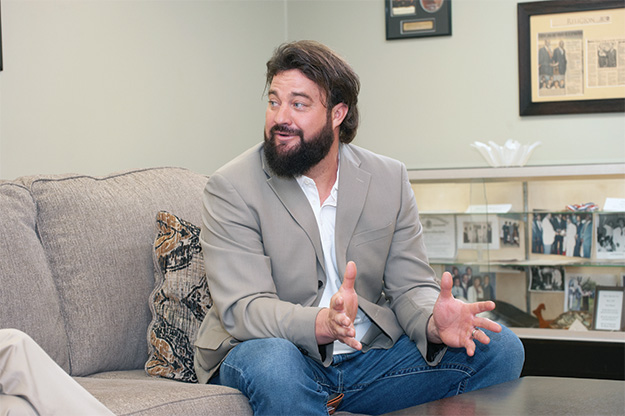
KG: How did each of you get into your current job or job field?
NS: I was studying history in college. And all I knew was that I wanted to be around students. I talked to my head professor … and he said, ‘People who study history do one of two things: They become lawyers, or they sell insurance. Do you want to do either one of those?’
RC: I’m a history minor. (laughter)
NS: That’s great for some! But I didn’t want to do that. And he said, ‘OK, go talk to this lady’ … she said, ‘I think being a teacher would put you around students constantly.’ So that’s what I did.
RB: I probably heard from the time that I could understand language that I was going to be a preacher. The older church mothers would hold me in their lap, give me a peppermint and say, ‘You’re going to be a preacher.’
I was a senior in high school, and I’d been wrestling with how God would use me …. I got my dad’s Bible and opened it up, and the first page that I opened it to, my eyes lock in on this scripture, ‘Woe be unto me if I preach not the gospel.’ And I shut the Bible and I put it down, and I was like, that’s my dad’s Bible. (laughs)
The Lord just kept reminding me of that scripture … and I was praying real intently about my calling (during grad school) … and I was at the cafeteria line … and the cafeteria worker who was serving the plates (stopped, locked eyes with me and said) ‘Young man, you’re being called to preach. And the reason I’m telling you this is because you’ve been seeking confirmation of your calling.’
I called my dad, told him what had happened, and he was like, ‘That sounds about right.’ … (But) he was never one to push us into that.
BL: I had a love for the church. People would say, ‘Don’t be surprised one day if God calls you to ministry.’ And I’d laugh and say, ‘We’re all called to ministry!’ I loved baseball, and I always thought probably coaching would be (my calling).
But I would get put in these situations where I would see this picture of a father when he does it right and he passes it on to his son. I just had this yearning desire — when the man’s good, the family’s good. So after I got done with my pro ball career, (God) paved the way for me to be called into ministry.
God’s placed me around a bunch of men to look at and remind them of their calling as men, no matter where they are.
RC: In 1979, as I was early in the (law) practice with my dad, my daughters were born. Melissa is now married with two sons. Melanie has cerebral palsy and learning disabilities. They had different educational experiences.
(With Melanie) we realized there were Medicaid things that we thought were true that were not (and vice versa), and things we didn’t know about public benefits. I decided, I’m going to learn more about this as a lawyer. That evolved into elder law, because the issues are so much the same.
For the last 30 years plus, I’m exactly where I need to be (in my legal practice).
RB: There’s a lot that I got from what you just said, but one thing is, nothing is wasted. Everything, in its time, God shows how this part of us or that part of us … He brings it together.
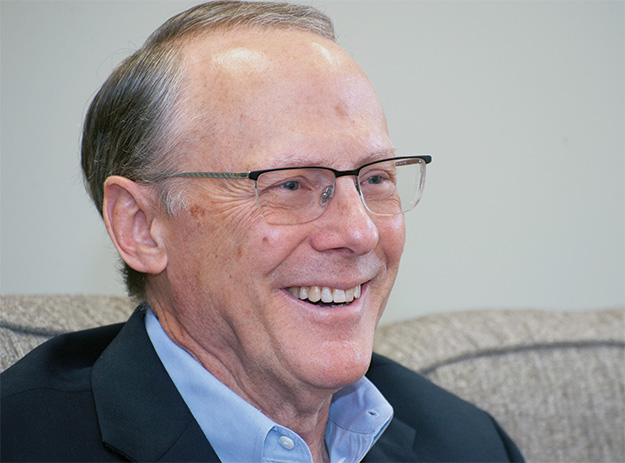
KG: I’d love to hear how each of you met your wives.
BL: We’ve been best friends since our youth days, and in college we started dating.
A wife who’s walking with you doubles your ministry. I want to be that man that she desperately needs, but knowing that the Man she desperately needs (Jesus) is who I’m trying to be like.
She owns a Pilates studio in Brandon. It’s a neat little ministry where she gets to meet women from all walks of life. She complements me as much as I complement her. We’re rolling into our 17th year.
RB: My wife is amazing. We’re 26 years this year. We were married August 2, 1997. From the time we were married, she said to me, ‘Where you go, I will go.’
When we got married … we were grad students at Illinois, and I was in my first pastorate in Illinois. She’s doing really well in her career, teaching math at Purdue, and I come home and say to her, ‘I’m praying about this … but I think God wants us to move back home.’
We had said we’d move home to Mississippi when we were ready to retire. She gave up a lot (when we moved back sooner).
What I am as a pastor (is) because she is my wife.
NS: Is she still teaching?
RB: No, she’s actually at UMMC. Her PhD is in curriculum and instruction. … So she’s now over accreditation for the school of medicine.
NS: I think I’m the youngest as far as age of marriage. We’re starting our 13th year.
We met at Mississippi State. After about three months, I knew I was going to marry her. So I did what every college guy does when they don’t know what they’re doing, and I broke up with her. Then she was in a long relationship with another guy.
She (eventually) broke up with him. I took her to the Neshoba County Fair, and we started dating then.
It takes a special woman to be a coach’s wife. It feels like I never see her in the spring.
RC: My wife and I met at Alta Woods Baptist Church in south Jackson. She was in GA’s (Girls in Action) and I was in RA’s (Royal Ambassadors). We started dating at the end of our junior year of high school. We both went to MC from 1971 to ‘75.
Also like every guy who knows what he’s doing, I broke up with her my freshman year. We were back together by the end of the year. This summer we’ll be 48 years married.
When our daughters were born, she quit working full time and started working as a secretary for the head of the Board of Ministerial Education at the Mississippi Baptist Convention.
We taught Sunday school together, and they always wanted to hear her teach, never me. I’m the logical, linear, rational thinker. She is intuitive, thoughtful, warm, and that really pulls people. Whenever there’s a question in our lives, I ask, ‘What do you think, darlin’?’ And whatever she says, that’s probably what we’re going to do.
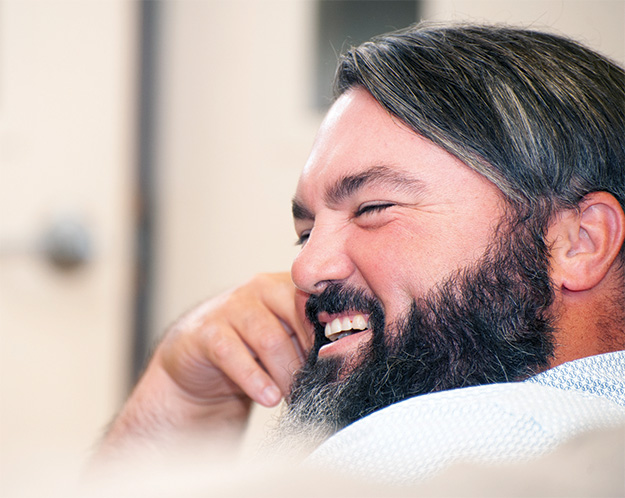
KG: What are the biggest lessons God has taught y’all — whether in marriage, ministry or career?
NS: I see students for about four years. That’s all I get (with them). I think the biggest thing is that the work of the Lord is not up to me. It’s up to me to plant the seeds, but the Lord produces the harvest. As long as I’m being obedient …
RC: I think a lesson for me is to let go and let God. I’m a linear, analytical person. Lawyers are trained to control things. (But) I have learned I don’t know what’s going to happen. I need to relax in my faith.
BL: There’s Brent’s will, and there’s God’s will. We’ve got to die to ourselves, pick up our cross and follow Him.
RB: Probably in month five or six (of having virtual church due to COVID), I got up and took a walk, and I wept like a baby. And my wife came and found me.
There (was) no manual for this. How do you shepherd sheep that you can’t see, who are in the hospital, and I’ve got to FaceTime with people who I know are about to die, and that’s the best I can do?
Your metrics for success are suddenly likes on YouTube. And you’re trying not to get sucked into that. You’re preaching for the amens, and you don’t have the amens. You don’t have the heads nodding.
I think the lesson learned from that (was) that it’s not up to us. It (was) getting to the point of, I’ve got to let God handle this, because I can’t. (But) God is big enough, He’s strong enough, and He knows enough to handle the things we don’t know or understand.